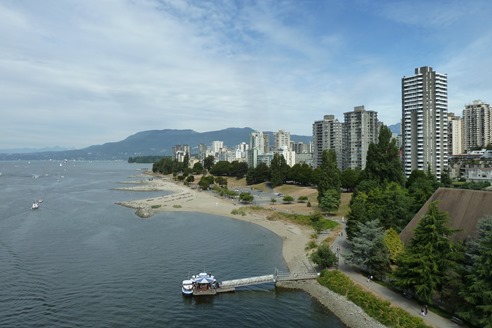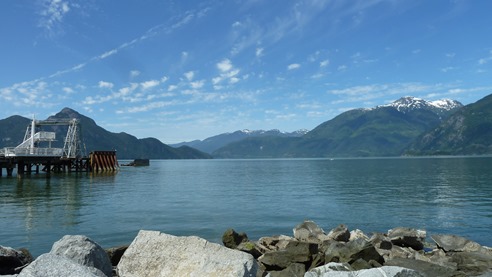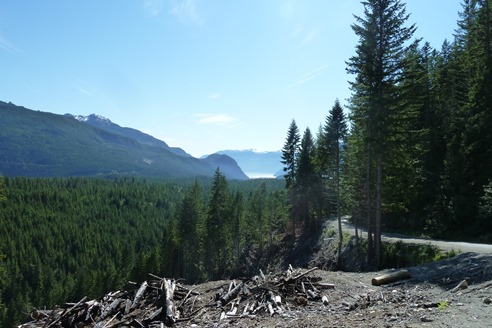Been a while, hasn’t it. Good to have you back. Come on in, sit back, and relax. You’re in good hands.
So here I am, a tad over seven months after I finally got all my belongings and made my way west. It was about time, I thought, that I start living where I have always wanted to—the great city of Vancouver.
So, why do I like it here? How about this for a start:
Vancouver’s downtown area is actually an island, and the picture you see above looks over English Bay, as it is seen while walking on Burrard Bridge and looking west. There were a few clouds when I took this picture but it still looks gorgeous—trust me, when the sky is blue, the view is unmatched.
So this is the edge of Vancouver’s downtown area, and for me, to get to these beaches, takes about 10 minutes of pleasant walking. I already have a few full weekends, spent almost solely lying down on those beaches breathing some fresh air, under my belt.
So, the best thing in Vancouver, for me, is the natural setting in which it is lies; and Vancouver itself is just the beginning—the views get even better once you leave the city and drive north or east (you can’t drive west, as the pacific ocean is right there; and driving south will take you to the USA within 30 minutes. It takes two hours and a half to drive from Vancouver to Seattle). For example, consider this picture, taken in one of my most favourite locations—Porteau Cove, which is a tiny provincial park found just off highway 99, about 25 minutes of a breathtaking drive north of the big city:
Drive a bit further north, take the exit to Diamond Head, drive up the mountain and…
And all of this is within 50km radius of Vancouver’s downtown area.
For nature-loving individual, it can hardly get any better than this city; there are prettier sights than these still (for example, the magnificent Canadian Rockies and some parts of Vancouver Island), but considering that Vancouver is a big city with so many things to offer, then factoring everything in, Vancouver—in my mind, at least—is the place to be in.
Life here is evidently different than life in the east coast. The differences in lifestyle between Canada’s west and east coasts are similar, at the outset, to the corresponding differences in the USA; so, if you’re an American who had lived in both areas, you are very likely to already know what I am talking about.
There are many such differences, most of which are only detectable by those who had the chance to live in both places.
One difference is in work/life balance; while in the Toronto area (which is Canada’s financial center) life seems to be mostly around working hard and making money, it is evident that west coasters take life much easier. It seems like people here put more emphasis on their own well-being and life’s “little pleasures” than their east coast counterparts.
Take sports and outdoor activities: people here, generally speaking, move their bodies. In North-America, I have never seen a more wide-spread use of bicycles; everywhere you go you see people cycling, jogging, walking around just for sport’s sake. Name an outdoor activity, and it is practiced here, often right in your backyard.
Or, consider the approach towards food and dining. Gastronomically speaking, healthy food is much more widespread here than in the east coast, as there’s definitely a higher level of awareness here to eating right and, in general, being healthy. Organic and other “niche” foods are big in here, while junk food restaurants are much less popular than in the east coast—that, despite the fact that food here—especially organic, whole food—is very expensive.
This approach to life, of enjoying its little pleasures, may seem at first to be tightly related to money—after all, it is expensive to live like this. It’s tempting to think so, however it is very untrue. If we compare Vancouver to Toronto, for instance:
- In most industries, salaries here are lower;
- Housing in Vancouver is more expensive, when you compare housing prices to the average earning power. As a matter of fact, relatively speaking, Vancouver offers the least affordable housing in the world (see this: http://www.cbc.ca/news/story/2010/01/26/consumer-home-affordability.html);
- Gas is about 15% more expensive here;
- Same goes for food, and other necessities.
People who move out west don’t do it in order to become rich, lets put it this way. In general, people here earn less and pay more; and research shows that they are relatively happier.
Yet something is… how to say it…
Something is a tad askew.
Recently, I finished reading a brilliant book named “The Paradox of Choice” by Barry Schwartz (link: http://www.amazon.ca/Paradox-Choice-Why-More-Less/dp/0060005696/ref=sr_1_1?s=books&ie=UTF8&qid=1315022719&sr=1-1). It has been on my “to-do” read (as well as on my shelf) for a couple of years but I never got around to read it; however, I have been spending quite some time on the beach recently so I decided to finally get around to read it while breathing the ocean’s fresh air.
One of the chapters in that book talks about a psychological process called adaptation. In general, this process refers to the “mental adjustment” one goes through while getting accustomed to new events, new situations, new realities. A positive event (such as winning the lottery) means much more to a person in the short period after the event’s occurrence, however as time passes by, the level of enjoyment gradually decreases until that person adapts to his new situation so it doesn’t serve as a such a huge source of joy.
Conversely, consider an individual who had just been informed that he had been diagnosed with some terminal illness. Studies have shown that, while the initial revelation imposes an immensely negative pressure on one’s mental well-being, adaptation kicks in at some point, and life, in turns, gradually becomes as normal as it can possibly get.
So back to west coast living. I mentioned, above, that something’s “a tad askew” with life in here, and I guess the best way to describe it is by saying that life here is so peaceful and positive (comparing to the so many other places I had the chance to experience), that it seems like people have very few reference points by which to determine what “peaceful and positive” really means.
Think about it: can you define what “peaceful and positive” means without having experienced hardships and negativity? Can you really appreciate the value of having a purposeful life without having gone through periods of mental numbness? Can you appreciate happiness without having experienced melancholia?
I doubt it. You can’t define “rich” without defining “poor” at the same time. Same goes for happiness and sorrow, purposefulness and boredom. It’s called “perspective”.
So, when your life is so positive and you’re so accustomed to being worry-free, you are—and that’s not me talking, folks; that’s how most humans’ brains operate—bound to look for ways to become happier, not necessarily because you’re sad but for the sole purpose of being able to define, for yourself, what happiness means.
That was a description of what happens on the individual level. Now take that and apply it to a group of quite a few tens of thousands of people. The result? Hedonism, taken to the very extreme. Continuously seeking for peak experiences. This is Vancouver.
Now, I should say: that, in itself, isn’t necessarily a bad thing. I am definitely not in the position to judge people and underestimating them for their constant pursuit of happiness and short-term gratifications. I say—whatever makes you happy, go for it. Do it. By all means.
The reason I’m mentioning it as something that is a bit odd, or a bit vexing, for me, is that I find it hard to subscribe to—let alone adjust myself to—such mentality. Amongst my (so very few) friends, I am not exactly known to be taking life too lightly or taking it for granted. Rather than seeking constant pleasures, I tend to be looking for value and purpose in everything I bother spending more than two seconds on. So, when I see Vancouver’s hedonistic lifestyle shining oh-so-brightly, I simply can’t bring myself to “connect” to it.
Time marches on—it’s September already!—each step revealing how different life is here in the big city comparing to what it used to be back in rural Ontario.
The complacency and simplicity of life in Waterloo have long been forgotten and replaced with rush and excitement on an almost-daily basis; the relative solitude stemming from life away from any big city has been replaced with a rather overwhelming dose of social interaction.
Living in a huge, 1800+ square feet, 3-stories house in Waterloo, seems like nothing but a dream (space-wise) or nightmare (in all other aspects) now, as I maintain my entire life over some 750 square feet, one bedroom apartment on the 15th floor in a building steps away from Vancouver’s best nightlife scene.
(Nowhere else on this planet have I seen such an amazing concentration of stupidly beautiful women on such a small land mass—perhaps, maybe, in Helsingborg, Sweden or Prague; But that’s a topic for another post)
A year and so ago, I embarked on my journey following Mark Knopfler’s “Get Lucky” tour, which has been an incredible experience and an immense challenge; having lived in the beautiful city of Vancouver for more than six months now (I spent about a month in Seattle before coming here), I am somewhat astonished to realize that adjusting to life here is no less challenging than breezing through 21 countries over 4 months using various methods of transportation following the best music this planet has ever had to offer. In many respects, I feel as worn out now as I felt on August 1, 2010—the day after the tour’s last concert in Gredos, Spain.
Throughout the craziness, more than a slight sense of vulnerability creeps in. The sense of complete control over pretty much everything, has been replaced by more than a bit of willingness—not to say desire—to simply let go, flow with everything and the hell with whatever happens.
And really… what’s the worst that can happen? after all, I am lucky enough to be living in (what I consider to be) the best city in the world to live in.
Be happy, stay happy, my friends.
Isaac



4 comments:
::
Hi, good you're back Isaac.
All in all I understand what you mean ( on a smaller size the place and the way of living here are alike that of Vancouver ).
What I do not understand literally is 'a tad askew'. Well..- to be precise- I understand askew: between horizontally and vertically, of course , ops sorry ..old memories :-))
but 'tad' ?? dee
Hi Dee,
Indeed, "askew" defines the results of your photo taking attempts... "a tad" is slang for "a little".
I have borrowed the phrase "a tad askew" from Seinfeld; I'm a big Seinfeld fan and it was used there a few times in extremely funny contexts :-)
I'm guessing you don't know many true East Coasters; I'm sure they would be rather upset with your description of Ontario being a coastal province, but I'm sure you westerners consider us as that!
LOL
Good to see you haven't forgotten how to write interesting and engaging text.
Post a Comment